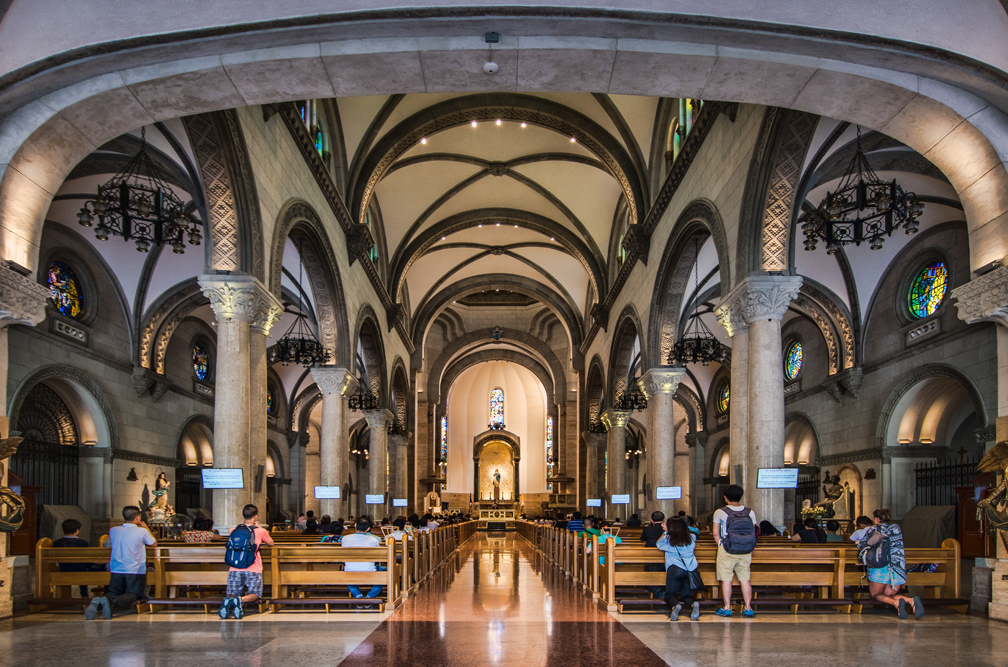
The bread that I will give is my flesh
for the life of the world.
John 6:51
THE CULMINATION OF OUR FAITH
The Mass is literally heaven on earth. This is where the miracle of our faith culminates and where we absorb the Word of God, participate in the greatest sacrifice to God, and receive Jesus Christ in the Eucharist. At Mass our souls are sanctified and nourished by the Bread of Life, Jesus himself. The Second Vatican Council stated that the Mass is the “source and summit of the Christian life” (CCC, 1324). It is important that we recognize it as such and take part in it with attention and reverence.
THE MASS IS BIBLICAL
In his audio CD, “The Mass Explained,” Fr. Larry Richards explores the Bible passages that prepare for the revelation of the Mass. He explains how God has been preparing man for the Mass from the time of his first covenant with Abraham. When Abraham, our father in faith, went up the mountain to sacrifice Isaac in obedience to God, he said, “My son, … God himself will provide the sheep for the burnt offering.” (Genesis 22:8). Later, John the Baptist recognized Jesus as that offering: “He saw Jesus coming toward him and said, ‘Behold, the Lamb of God, who takes away the sin of the world’” (John 1:29).
At the Last Supper, Jesus gave us the sacrifice of the Eucharist for all time:
When the hour came, he took his place at table with the apostles. He said to them, “I have eagerly desired to eat this Passover with you before I suffer, for, I tell you, I shall not eat it [again] until there is fulfillment in the kingdom of God.” Then he took a cup, gave thanks, and said, “Take this and share it among yourselves; for I tell you [that] from this time on I shall not drink of the fruit of the vine until the kingdom of God comes.” Then he took the bread, said the blessing, broke it, and gave it to them, saying, “This is my body, which will be given for you; do this in memory of me.” And likewise the cup after they had eaten, saying, “This cup is the new covenant in my blood, which will be shed for you.” (Luke 22:14-20)
Jesus tells us that he eagerly desires to share his body, blood, soul and divinity with us. He tells the apostles to “do this in memory” of him (Luke 22:19). This is a loving command, not a suggestion.
After Jesus’ resurrection, he meets two of his disciples on the road to Emmaus. At first they do not recognize him. What follows is a Mass. Jesus cites Scripture and interprets it for them (the readings and homily, or Liturgy of the Word). When they reach their destination, they say, “Stay with us.” Jesus stays with them, as he stays with all of us through the Bread of Life, the sacrament of the Holy Eucharist. Upon consuming Jesus’ body, blood, soul, and divinity, the disciples recognize Jesus (see Luke 24:27-35). We too must open our eyes and see Jesus’ presence in the Eucharist.
The Eucharist is the Body and Blood of Jesus. Jesus made this apparent in what is called the Bread of Life discourse:
“I am the bread of life. Your ancestors ate the manna in the desert, but they died; this is the bread that comes down from heaven so that one may eat it and not die. I am the living bread that came down from heaven; whoever eats this bread will live forever; and the bread that I will give is my flesh for the life of the world.”
The Jews quarreled among themselves, saying, “How can this man give us [his] flesh to eat?” Jesus said to them, “Amen, amen, I say to you, unless you eat the flesh of the Son of Man and drink his blood, you do not have life within you. Whoever eats my flesh and drinks my blood has eternal life, and I will raise him on the last day. For my flesh is true food, and my blood is true drink. Whoever eats my flesh and drinks my blood remains in me and I in him. Just as the living Father sent me and I have life because of the Father, so also the one who feeds on me will have life because of me. This is the bread that came down from heaven. Unlike your ancestors who ate and still died, whoever eats this bread will live forever.” (John 6:48-58)
Jesus made his point so clear that many of his disciples left because they couldn’t believe it. Jesus did not back down; he wanted people to understand this teaching. “The words I have spoken to you are spirit and life” (John 6:63).
Jesus Christ is present in every particle of the consecrated bread and every drop of wine. While the “accidents” (taste and appearance) remain, the substance is truly changed to Jesus Christ. We refer to this miracle as transubstantiation. It occurs at every Mass.
THE MASS: THE WORD OF GOD, THE SACRIFICE, AND THE EUCHARIST
The Mass is composed of the Liturgy of the Word and the Liturgy of the Eucharist. In the Liturgy of the Word, readings are proclaimed from the Bible, the inspired Word of God. On Sundays and some feast days, we hear four passages from sacred Scripture: one from the Old Testament, the Acts of the Apostles, or Revelation; a Psalm response, often sung; one from a New Testament letter; and one from a Gospel. At weekday Masses, there are usually just three readings: one from the Old Testament or a New Testament letter, a Psalm response, and a Gospel reading. The priest will then give a homily, a message based on the readings or on the day’s feast.
Why do we call the Mass the “holy sacrifice of the Mass”? What is the sacrificial aspect? This is the principal element of the Mass. The Mass is the same sacrifice as that of Jesus on the cross: “The Eucharist is . . . a sacrifice because it re-presents (makes present) the sacrifice of the cross, because it is its memorial and because it applies its fruit” (CCC, 1366, emphasis original). Like Jesus’ sacrifice on the cross, the Mass unites us intimately with Christ, separates us from sin, and unifies us as one body (see CCC, 1391–1396). It has the same offering and the same priest—Jesus Christ: “At its [the Eucharistic assembly’s] head is Christ himself, the principal agent of the Eucharist. He is high priest of the New Covenant; it is he himself who presides invisibly over every Eucharistic celebration” (CCC, 1348).
But there is a difference in the way the sacrifice is offered. Jesus only died and shed his blood once, but during the Mass, the glorified and risen Christ continues to offer himself and what he has accomplished on the cross to the Father for the sins of the world. This sacrifice, transcending time and space, is renewed and re-presented to God at every Mass.
Every time we attend Mass, we are active participants, playing a vital role. When the priest says, “Pray, brothers and sisters, that my sacrifice and yours may be acceptable to God, the almighty Father,” and we say, “May the Lord accept the sacrifice at your hands, for the praise and glory of his name, for our good and the good of all his holy Church,” we unite ourselves to the holy sacrifice of the Mass. What does that mean exactly? When we say the above response, we are offering our lives—our every word, thought, and action—along with the sacrifice of Jesus, to God the Father. We are offering ourselves to God, in union with the greatest sacrifice of all!
And now we get to receive Jesus in the Holy Eucharist! Partaking in the Eucharist makes us one with God and one with each other. Without the Eucharist, we cannot live. Keeping a distance from the Eucharist or receiving the Eucharist unworthily can lead to spiritual death:
Therefore whoever eats the bread or drinks the cup of the Lord unworthily will have to answer for the body and blood of the Lord. . . . For anyone who eats and drinks without discerning the body, eats and drinks judgment on himself. That is why many among you are ill and infirm, and a considerable number are dying. (1 Corinthians 11:27, 29-30)
Thus it is important to be free of mortal sin when receiving Communion; going to confession beforehand may be necessary. Also, as St. Paul says, we must recognize the Eucharist as “the body of the Lord,” which is why the Church does not offer Communion to those who do not profess the Catholic faith, including the teaching of transubstantiation.
Some people might think it is enough to just pray to Jesus, since he is everywhere, rather than attend Mass on Sunday. But imagine yourself at home while your spouse is on a business trip. You can call and text them, but does any form of communication compare to physically being with them? Jesus is truly present at the Catholic Mass, and when we receive Communion, we make physical contact with him. We become part of him, and he transforms us. “Whoever eats my flesh and drinks my blood remains in me and I in him” (John 6:56). “Remain in me, as I remain in you” (John 15:4).
When we leave Mass, we are more like Jesus, more the person he wants us to be, than we were when we came in. We are completely us—a purified version of ourselves, further removed from sin and closer to God. The Mass transforms us through the real presence of Christ. A sacrifice of love, it makes us “a community of love.”
This is my commandment: love one another as I love you. No one has greater love than this, to lay down one’s life for one’s friends. You are my friends if you do what I command you. I no longer call you slaves, because a slave does not know what his master is doing. I have called you friends, because I have told you everything I have heard from my Father. It was not you who chose me, but I who chose you and appointed you to go and bear fruit that will remain, so that whatever you ask the Father in my name he may give you. This I command you: love one another. (John 15:12-17)
What a blessing it is that, in our country, we can attend Mass every day, openly and without persecution. We have the privilege of participating in this profound miracle every day. Visit Masstimes.org to see the Masses in your area. Go offer your life to God, and receive Jesus Christ, who eagerly desires you!
MASS RESPONSES
Catholic Mass ResponsesSUGGESTED READING
- A Biblical Walk Through The Mass: Understanding What We Say And Do In The Liturgy, Edward Sri.
- God Is Near Us: The Eucharist, the Heart of Life, Joseph Cardinal Ratzinger (Pope Benedict XVI).
- Jesus and the Jewish Roots of the Eucharist: Unlocking the Secrets of the Last Supper, Brant Pitre.
- The Lamb’s Supper: The Mass as Heaven on Earth, Scott Hahn.
- Magnificat (us.magnificat.net) and The Word Among Us (wau.org) are monthly publications that give the Mass readings for each day, the prayers of the Mass, and inspiring meditations.
This page is taken from the book, A Miracle Awaits: Encountering Christ In His Church by Carol Dintelman, which is available for purchase in print or digital formats here.
Or read the full book online! Click to visit the contents page, endorsements, copyright, acknowledgments, and notes.
